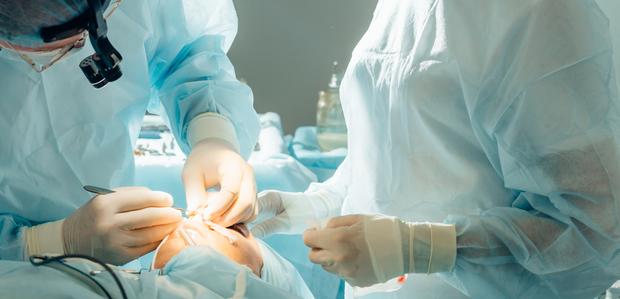Department of Cranio Maxillofacial Surgery

Cranio-Maxillofacial Surgery addresses complex issues related to the skull, face, jaws, and associated structures. It is a specialised field within surgery that encompasses a wide range of procedures aimed at correcting congenital, acquired, and traumatic deformities of the craniofacial region. This intricate branch of medicine requires a multidisciplinary approach, advanced techniques, and precision to restore both function and aesthetics.
What is Cranio-Maxillofacial Surgery?
Cranio-Maxillofacial Surgery focuses on treating abnormalities and injuries affecting the head, face, and neck. It involves intricate procedures, often utilising state-of-the-art technology and surgical techniques, to correct anomalies in bone structure, soft tissues, and dental occlusion. This field of surgery aims to restore function, appearance, and general quality of life by treating congenital, acquired, and traumatic malformations and anomalies in these areas. These surgeries aim not only to enhance appearance but also to improve functionality, such as breathing, speaking, and chewing.
Conditions Treated in Cranio-Maxillofacial Surgery
A broad spectrum of problems affecting the cranial (skull) and maxillofacial (face and jaws) areas is included in craniomaxillofacial surgery. Craniomaxillofacial Surgeons are qualified to identify and manage a wide range of traumatising, acquired, and congenital disorders in these regions. Craniomaxillofacial surgery treats a variety of conditions, such as:
- Cleft Lip and Palate: A common congenital condition where a gap exists in the upper lip and/or the roof of the mouth.
- Craniosynostosis: Premature fusion of skull bones in infants, leading to an abnormal head shape.
- Facial Trauma: Injuries to the facial bones, often resulting from accidents, falls, or sports-related incidents.
- Tumours: Both benign and malignant growths affect the facial and cranial structures.
- Maxillofacial Deformities: Irregularities in jaw or facial bone structure causing functional or aesthetic issues, often corrected through surgical procedures like orthognathic surgery or reconstruction.
- Facial Paralysis: Traumatic injury, brain tumour or tumour excision, stroke, infection, and other congenital anomalies that result in facial paralysis.
- Obstructive Sleep Apnea (OSA): Procedures performed on OSA patients to alleviate airway blockage; these procedures tend to involve the soft palate and jaw.
Diagnostic Tests in Cranio-Maxillofacial Surgery
Various diagnostic tests are used in craniomaxillofacial surgery to diagnose and analyse disorders pertaining to the maxillofacial (face and jaws) and cranial (skull) regions. Surgeons can more precisely detect various problems and devise effective treatment plans with the use of these diagnostic tests. In craniomaxillofacial surgery, some common diagnostic procedures include:
- X-rays: Traditional X-rays are frequently utilised to get two-dimensional pictures of the teeth, face, bones, and skull. They offer important details on anomalies, fractures, and the arrangement of the facial features.
- CT Scan (Computed Tomography): CT scans offer detailed three-dimensional pictures of the craniofacial anatomy. When evaluating complicated fractures, bone abnormalities, tumours, and congenital defects, this imaging method is very useful.
- MRI (Magnetic Resonance Imaging): The craniofacial region's soft tissues, nerves, blood vessels, and muscles can all be seen using MRI. It is especially helpful in assessing diseases pertaining to the nerves and soft tissue tumours.
- Ultrasonography: In some areas of the face and neck, ultrasonography is utilised to assess blood flow and soft tissue anomalies.
- Dental Impressions: Moulds of the teeth and jaws derived during dental impressions aid in planning dental and orthognathic procedures.
- Angiography: To see blood flow and vascular architecture, angiography is done. It requires injecting contrast dye into blood arteries. Thyroid cancers and vascular anomalies can be evaluated using it.
- Physical Examinations: Comprehensive assessments of facial features, bite, and cranial proportions are done during physical examinations.
Why Choose Gleneagles Hospitals?
Gleneagles Hospitals stand out as a premier choice for Cranio-Maxillofacial Surgery due to its unmatched blend of expertise, cutting-edge technology, and patient-centred care. Renowned for its specialist teams with extensive experience in complex craniofacial procedures, the hospital boasts state-of-the-art equipment, ensuring precise diagnostics and surgeries. With a commitment to holistic care and tailored treatment plans, Gleneagles Hospitals consistently delivers exceptional outcomes, earning trust through a proven track record of successful surgeries and satisfied patients.
Procedures Performed in Cranio-Maxillofacial Surgery
Treatment of conditions affecting the cranial (skull) and maxillofacial (face and jaws) areas is the goal of a variety of surgical procedures performed in craniomaxillofacial surgery. Professionals in the field of CranioMaxillofacial Surgery perform these surgeries to rectify abnormalities, reinstate functionality, and enhance appearance. Some common craniomaxillofacial surgeries include:
- What are the common conditions treated in craniomaxillofacial surgery?
Common conditions include cleft lip and palate, craniosynostosis, facial trauma, facial paralysis, maxillofacial deformities, and obstructive sleep apnea, among others.
- Is the surgery painful?
While there may be some post-surgery discomfort, modern surgical techniques, anaesthesia, and pain management protocols ensure that pain is minimized during and after the procedure.
- How long is the recovery period after craniomaxillofacial surgery?
Recovery time depends on the complexity of the surgery. Most of the patients experience a time of recovery in weeks and months, and our highly skilled medical team provides exceptional care and monitoring.
- Why should I choose Gleneagles Hospitals for my craniomaxillofacial surgery?
With specialized expertise, advanced technology, and personalized care, Gleneagles Hospitals is known for its successful treatment outcomes for all its patients as it has a multidisciplinary team.
FAQ
Why Choose Us?
-
PATIENT EXPERIENCE
Your care and comfort are our top priorities. We ensure that the patients are well informed prior to every step we take for their benefit and that their queries are effectively answered.
-
LATEST TECHNOLOGIES
The Gleneagles Hospitals' team stays up to date on the advancements in medical procedures and technologies. Experience the Future Healthcare Technologies now at Gleneagles Hospitals.
-
PROVIDING QUALITY CARE
Strengthening lives through compassionate care, innovative therapies and relentless efforts. It reflects in the DNA of our passionate team of doctors and dedicated clinical staff.









